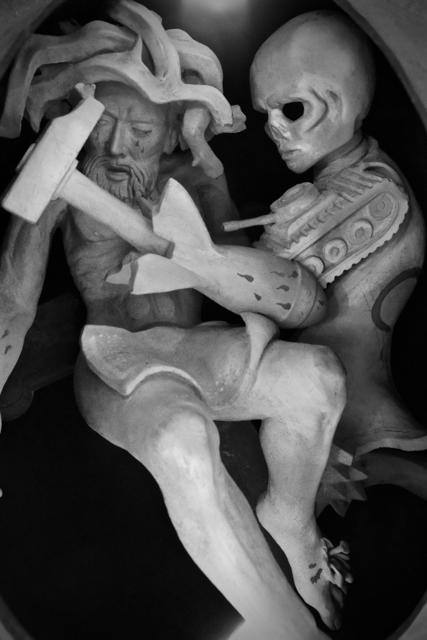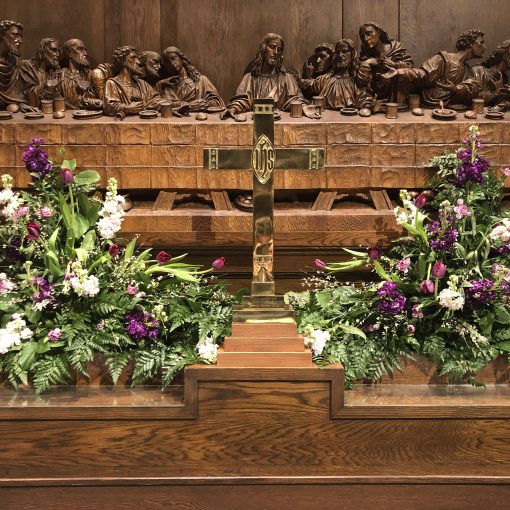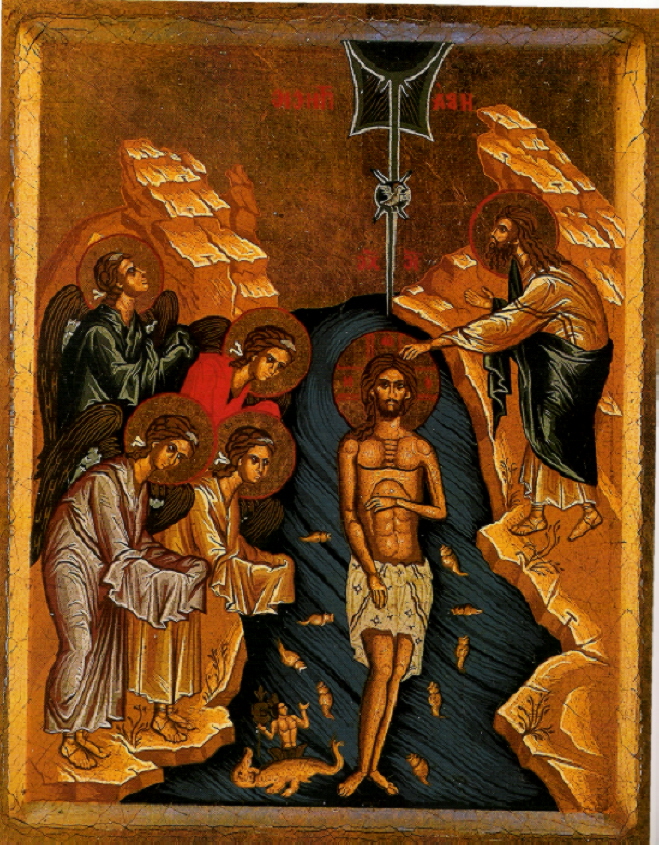Second Sunday of Advent (December 10, 2023)
“Therefore, beloved, while you are waiting for these things, strive to be found by him at peace, without spot or blemish; and regard the patience of our Lord as salvation.” In the name of …
We come to religion for answers. There may be various and different expressions of it, we each have our own path, we might be seeking comfort, community, or purpose, but at the root of it all, our human nature wants answers. Even if we grew up within a religion, we stay within it because we are seeking answers. People often leave religion when they feel that the answers provided are not adequate or that they find better answers elsewhere.
Sometimes, and for some things, the answer is simply, “we don’t know.”
Too often, we put God into those gaps in our knowledge, as an explanation for what we do not (yet) know. Nietzsche wrote about priests that “into every gap they put their delusion, their stopgap, which they called God” (Thus Spoke Zerathustra). Of course, the issue is, when we do find some non-supernatural explanation for the “gap,” where does that leave our god? No, God is more than just a “filler.” And that is just what the Bible tells us, that God is not the “god of the gaps” but the source of all light and life, the creator and redeemer. And…and we still have questions. We still have gaps in our knowledge, not just of facts and science, but of our experience. Why? Why did this happen, why didn’t thathappen? We will never have all our questions answered, yet we should not shy away from asking the questions that most press upon our heart! What are those questions for you? I want to know, so that together we can explore them.
When I was in college, just starting to really study the Bible, I clearly remember sitting by Beebe Lake, in the old sandwich shop called the “Noyes Lodge,” thinking about the fact that so much time had elapsed since Jesus ascended “to prepare a place for us.” I had begun to understand that, even by really conservative estimates, Abraham would have lived 1800 years before Jesus entered into this world. The Covenant that God had made with Abraham and his descendants was fulfilled in Jesus, okay, but we are now more than 2000 years from Jesus’s time. Why? What taking so long? And the world did not seem all that much better off than when Jesus left us. While I did not think of today’s epistle on that day, today we find Peter addressing just these two most pressing questions.
The concerns that I had (and still ponder) are nothing new. Peter and the early church felt his absence acutely in the decades after Jesus’s death, resurrection, and ascension. The followers of Jesus looked around and said, it’s been a minute (as the saying goes today) since Jesus left to prepare a place for us. What is taking him so long? And what about his coming to bring justice? These may not be your questions, but they were mine and I think they still present a challenge for many. I don’t think we can consider Advent, our expectation of the Parousia, Christ’s coming to set all things Right, and not wrestle with these questions anew.
Peter’s answer to these questions is to consider the nature of time and that God does not experience it in the way that we do, here on Earth. “But do not ignore this one fact, beloved, that with the Lord one day is like a thousand years, and a thousand years are like one day. The Lord is not slow about his promise, as some think of slowness, but is patient with you, not wanting any to perish, but all to come to repentance.” First, and this is what struck me while sitting next to Beebe Lake, God does not exist in time as we do. In fact, I would argue that God is outside of time and space.
We live, and thus write our stories and histories as the Bible does, in a line, moving inexorably from yesterday through today and into tomorrow. We cannot go back to yesterday, we cannot make changes in the past, but we live in this present moment. As my college roommate reminded me just last night, the author of Hebrews said, “exhort one another every day, as long as it is called “today.” We live in a two-dimensional world of time; God is not so bound.
God is outside of time. God has always been and preexisted the conception of time. Since that is the case, since for God “one day is like a thousand years, and a thousand years are like one day,’ why must we continue to think of “life after death” in a linear progression? If we recognize that God is outside of time and space, could it not be that when one dies one is also outside of this linear path? If so, regardless of the point in history at which we each die, we all arise at the same moment, on the Day of the Resurrection. Christ’s return then is not “delayed” but is always in the future and always at this moment. As Emil Brunner put it, “the being with Christ and the future coming of the Lord [are] both … one and the same.”[1] We could put it another way, that may sound slightly heretical, but I assure you it is not! The Parousia, the Advent we celebrate and look forward to, is now. For each of us, as we make that immortal transition, we are raised imperishable (as Paul says) and we enter into God’s promised Justice and Mercy. Jesus is not slow in returning, he is already and is simply waiting for us.
Allowing us to carry on our journey, our path of linear life, is God’s mercy. Peter makes this clear, “The Lord is not slow about his promise, as some think of slowness, but is patient with you, not wanting any to perish, but all to come to repentance.” This is God’s mercy…that he waits for us to repent. We, all of humanity, are allowed to live out our lives fully so that we may repent, to turn and follow the Way of Jesus. This is the whole testimony of Scripture, even as we see it in today’s readings. Isaiah, the Psalm, the entire history of Israel shows us the ebb and flow, the back and forth, the relationship of God with his people. We hear it and recite it in our eucharistic prayer. “We give thanks to you, O God, for the goodness and love which you have made known to us in creation; in the calling of Israel to be your people; in your Word spoken through the prophets; and above all in the Word made flesh, Jesus, your Son.… In him, you have brought us out of error into truth, out of sin into righteousness, out of death into life.”
God created us, loves us, and allows us to rebel. While he chastises, God continues to draw us back into relationship through his mercy and grace. All of Scripture speaks of God’s love and discipline, comfort and forgiveness, and God’s patience as he waits for us to repent. Our readings speak of the coming day of Judgment because God is a just God. And a merciful God.
Now, we wait. “In accordance with his promise, we wait for new heavens and a new earth, where righteousness is at home.” We wait, but waiting is not being motionless. We are not without purpose and activity, while we wait. And we are not to be doom-scrolling on our phones. I think of that old sermon illustration that observed how the English word “wait” does not only mean to delay action, it also means to serve another, to wait upon someone, say in a restaurant, meeting their needs. A “waiter” is one who serves, who is a watcher, a guard, and the Prophet Isaiah reminds us that, “those who wait upon the LORD shall renew their strength, they shall mount up with wings like eagles, they shall run and not grow weary, they shall walk and not faint!” (Isa. 40:31).
Now, we wait. Wait upon the LORD who has charged us to love and to serve one another. Today, I will give you one specific service to perform: invite your fellow parishioner, the ones you know who have not been back to St. John’s in some time, to return and join us as we celebrate both Advents of the Lord. (Elaborate on this…)
“Therefore, beloved, while you are waiting for these things, strive to be found by him at peace, without spot or blemish; and regard the patience of our Lord as salvation.” Amen.
[1] Emil Brunner, Eternal Hope, (Philadelphia: Westminster Press, 1954), p. 153.





